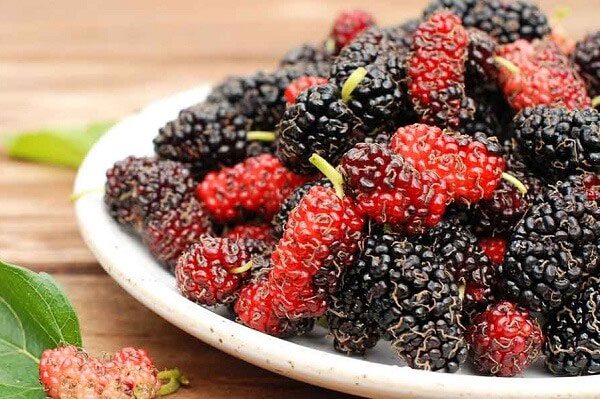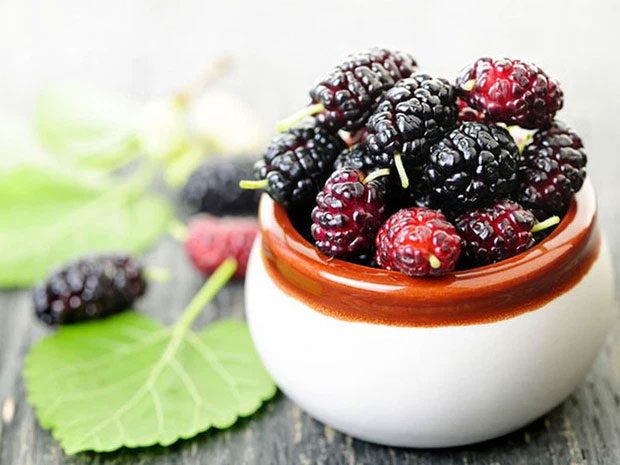Mulberry Season is Here! The mulberry season lasts only about 3 to 4 weeks, so don’t miss out! Take the opportunity to transform this delicious fruit into refreshing drinks that are both tasty and beneficial for the summer.
Benefits of Mulberries
- Chemical Components in Mulberry Parts
- Nutritional Components in Mulberries
- Effects of Mulberries
- 1. Lowers Cholesterol
- 2. Controls Blood Sugar Levels
- 3. Aids Digestion
- 4. Prevents Premature Aging
- 5. Good for Eye Health
- 6. Boosts Immune System and Prevents Common Colds
- 7. Builds Bone Tissue
- 8. Quenches Thirst and Aids Constipation Relief
- 9. Good for Cardiovascular Health
- 10. Supports Weight Loss
- 11. Beneficial for Joint Health
- Traditional Remedies Using Mulberries
Mulberries typically appear in late spring to early summer, around the end of March to early April. The peak season for mulberries lasts only about 3 to 4 weeks. When ripe, the fruit is red or black; it’s soft, sweet-sour, and juicy. The young leaves can be used as greens for boiling, stir-frying, or soups like other vegetables.
Chemical Components in Mulberry Parts

The peak season for mulberries lasts only about 3 to 4 weeks.
Mulberry leaves contain free amino acids (phenylalanine, leucine, alanine, arginine, sarcosine, pipercholic acid, etc.); proteins, vitamins C, B1, D; organic acids: succinic, propionic, isobutyric, etc.; and tannins. The fruit contains sugars, proteins, tannins, and vitamin C.
Mulberry branches contain mulberrin, mulberrochromene, cyclomulberrin, morin, dihydromorin, dihydrokaempferol, and maclurin.
Nutritional Components in Mulberries
Fresh mulberries consist of 88% water, 60 calories, along with 9.8% carbohydrates (simple sugars such as glucose and fructose), 1.7% fiber (including 25% soluble fiber in the form of pectin and 75% insoluble fiber in the form of lignin which helps with digestion and lowers cholesterol), 1.4% protein, and 0.4% fat.
Additionally, mulberries are rich in vitamins and minerals such as vitamin C, iron, vitamin K1, potassium, and vitamin E. These nutrients are beneficial for the body.

Consuming mulberries or drinking mulberry juice helps reduce excess fat and lower cholesterol levels.
Effects of Mulberries
1. Lowers Cholesterol
High cholesterol levels are linked to an increased risk of heart disease. Therefore, consuming mulberries or drinking mulberry juice can help reduce excess fat and lower cholesterol levels. Additionally, some studies have shown that mulberries can reduce fat accumulation in the liver, preventing fatty liver disease.
2. Controls Blood Sugar Levels
Mulberries contain the compound 1-deoxynojirimycin (DNJ), which inhibits an enzyme in the intestine that breaks down carbohydrates, a type of sugar that quickly raises blood sugar levels, posing a danger to diabetic patients. Thus, mulberries are very beneficial for managing diabetes.
3. Aids Digestion
Mulberries are rich in soluble fiber, so consuming them helps maintain stable digestive function.

A small portion of mulberries can nearly meet the daily vitamin C requirement.
4. Prevents Premature Aging
Mulberries are high in vitamins A, C, and E, along with carotenoid components like lutein, beta-carotene, zeaxanthin, and alpha-carotene. These substances help combat oxidative stress and fight against free radical attacks, resulting in smoother skin, and healthy, shiny hair.
5. Good for Eye Health
Mulberries contain zeaxanthin, which reduces oxidative stress in eye cells. The carotenoids present in mulberries help prevent cataracts and macular degeneration.
6. Boosts Immune System and Prevents Common Colds
Mulberries enhance the immune system by activating macrophages through their alkaloids. Macrophages keep the immune system alert to prevent harmful agents from affecting health. Additionally, mulberries contain vitamin C, an essential factor for boosting immunity.
Flu or colds are common ailments, and consuming mulberries can address these issues. White mulberries have been used in traditional remedies for these conditions. They act as a disinfectant to prevent and treat flu and colds thanks to their beneficial minerals.
7. Builds Bone Tissue
Mulberries contain vitamin K, calcium, and iron. This combination of nutrients is optimal for maintaining and building strong bone tissue. These nutrients help reverse signs of bone degeneration and prevent disorders like osteoporosis and arthritis.
8. Quenches Thirst and Aids Constipation Relief
Mulberry juice is effective for cooling the body and detoxifying. Particularly, if someone has boils or feels heat within, they can consume this juice daily for improvement. Moreover, mulberry juice contains a substantial amount of vitamin C, which is effective for treating constipation.

Mulberry juice contains calcium, iron, and vitamin K.
9. Good for Cardiovascular Health
Regular consumption of mulberry juice helps reduce bad cholesterol levels in the body, effectively preventing cardiovascular issues. Additionally, antioxidants, polyphenols, and flavonoids in mulberry juice promote the healthy development of the cardiovascular system, maintaining stable blood flow and preventing heart attacks and strokes.
10. Supports Weight Loss
A healthy digestive system is crucial for maintaining an appropriate weight. Researchers have shown that individuals who regularly consume mulberry juice or eat mulberries can lose about 10% of their body weight in nearly three months. Furthermore, drinking mulberry juice consistently and correctly can significantly reduce excess fat around the waist and thighs.
11. Beneficial for Joint Health
Mulberry juice contains calcium, iron, and vitamin K. These are essential nutrients for building and maintaining strong bone tissue, preventing disorders like arthritis and osteoporosis.
Traditional Remedies Using Mulberries
Not just a supplement for health, mulberries also feature in many traditional Eastern medicine remedies for various ailments. Here are some remedies that utilize mulberries, as revealed by experts:
- For joint pain, backache, dizziness, fatigue, forgetfulness, dizziness, and constipation: Regularly consuming ripe mulberries daily can alleviate these symptoms.
- Supports diabetes treatment: 30g fresh mulberries, 20g Tianhua powder, and 15g raw earth. All ingredients are added to a pot, boiled with 500ml of water until only 150ml remains, divided into two doses throughout the day. Use continuously for 7 days.
- Treats insomnia, dry skin, poor eyesight, and premature graying of hair: 30g fresh mulberries, 50-60g sticky rice, and enough rock sugar. Wash the sticky rice and mulberries, add water, and cook into porridge. When cooked, add a little rock sugar for sweetness and enjoy.
- For indigestion and bloating: 10g mulberries and 6g white atracylodes. Boil with 500ml of water and divide into three doses throughout the day.
- For night sweats in children and sweaty palms in adults: Cooking young mulberry leaves with shrimp or prawns to be eaten daily can improve sweating issues.
- For eye pain and chronic conjunctivitis: Boil mulberry leaves to extract water and use it to wash the eyes to reduce inflammation and pain.
- For making mulberry juice to cool the body and detoxify: Wash and drain the mulberries. Layer mulberries with sugar at a ratio of 2kg of mulberries to 1kg of sugar. Let sit for a day for the sugar to dissolve, filter the juice, boil until it thickens and has a fragrant aroma. Let cool, then refrigerate for later consumption.
Mulberry leaves may help treat diabetes



















































